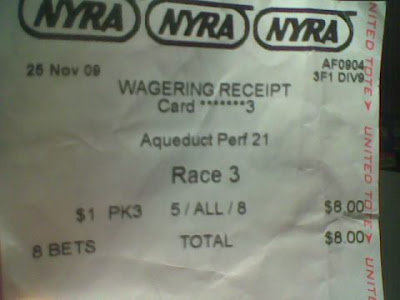American racing handle is down over $1 billion 7 months into the year. This is a steep decline off of 2008 which steeply declined from 2007. Instead of ringing the alarm and reaching for the slots lifeline to prop up the failing venues, racing should let the failing tracks close. We have market forces trying to "right size" the racing industry, but rather than let the natural forces transform racing into a healthy industry we have the racing industry pushing back with slots.
Instead of a healthy and fit industry we have a slew of uninteresting tracks and an industry too large to maintain. Last year 54,000 races were run in North America with $14 billion in handle. In comparison Japan ran 3,400 races and had $28 billion in handle! While most Americans are not going to bet like the Japanese it would be better if racing allowed the market forces to shape North American racing like JRA racing; reducing the amount of races and increasing the quality. In Japan every racecard is an event, here in North America other than a few boutique meets every race is like another endless spin of the roulette wheel. At many venues few people watch or wager on the action; the races denigrated into a pseudo-welfare distribution event for slot revenues.
There will be some pain as the industry "right sizes" but it is vital that American racing becomes healthy. No wasteful corruption laced government programs are needed to manage racing, it is just a question of letting the market close tracks and concentrate the fields at the successful venues. Rather than "right sizing" the game we have racing continually subsidizing low quality short fields with slots. These races pull horses from successful venues and the handle is not relative to the purse.
Slots are going to be the slow death of racing. Too many races with too many horses spread out at too many tracks. With all of these tracks the competition is severely diluted. Also with this slot-based artificially augmented demand for horses there is nowhere to retire the horses when their racing careers are over. Even with all of this baggage being lugged around racing still holds it weight and outgames other sports in TV rating for the triple crown events. Racing still has a sizable niche market and since it is a unique sport there is always the potential that racing could take off as tastes change. Racing will never have the chance to reach the mainstream if it can not "right size".
Subscribe to:
Post Comments (Atom)



3 comments:
I wonder where all the horseplayers in Nebraska bet after Ak-Sar-Ben closed? No Aqueduct winter meet. No Calder summer meet. Awful lot of tracks in La will have to close. Cut Turfways meet in half. Goodbye Ellis. Goodbye Beulah. Goodbye River Downs. One of you guys in Pa will have to volunteer. Sorry Cangamble but all your efforts to save Fort Erie go for naught. This should be a good start. Glad I don't own the Racing Form. Want to guess what happens to the handle? Wait! The Guv of La says we aren't closing nothing. An obstructionist.
RG
I agree with "reducing the amount of races and increasing the quality", but it's not market forces that keep the number of JRA races low, it's a strict centralized system that does the trick over there.
Having missed that boat, uncontrolled downsizing by market forces is the best option available for American tracks right now.
You should also be aware that the stats you quote are JRA-only; there are more than 14.000 more races under the supervision of local governments in Japan, which attracted a handle of just under 4 billion US$ in 2008.
Unlike most of the world however, the Japanese are smart enough to draw a clear line between top racing (the kind suited to attract new customers and satisfy the fans' interest) and basic racing (the kind suited to cater to the handicappers' every-evening needs). Both can be good for racing, but a pointless mixture of them isn't gonna help.
Maker makes two good comments. One is that the only thing that will save racing from a slow painful death is strong, centralized management. The government won't do it here, so racing will have to do it by itself, in effect, turning the whole industry over to an all-powerful commissioner. Don't hold your breath.
Second, small local tracks can co-exist with big league racing, just as in baseball. But tracks have to recognize, or be told, which they are.
Japan's a pretty good model -- and their technology is a lot better than ours, too.
Post a Comment